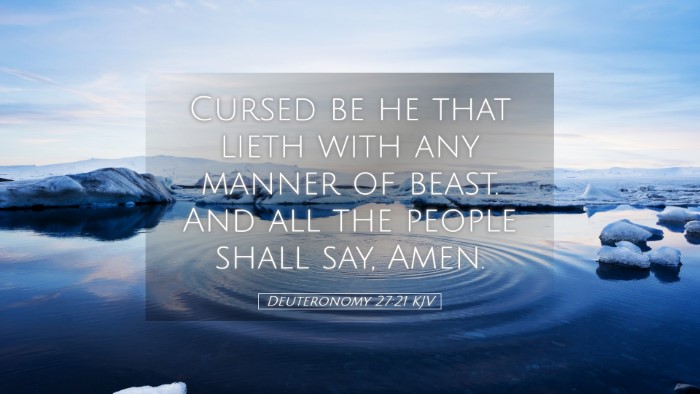Commentary on Deuteronomy 27:21
Bible Verse: "Cursed be he that lieth with any manner of beast. And all the people shall say, Amen."
Introduction
The verse from Deuteronomy 27:21 serves as part of a broader context within the Mosaic Covenant, which outlines various blessings and curses associated with obedience and disobedience to God's commandments. This commentary synthesizes insights from revered biblical scholars such as Matthew Henry, Albert Barnes, and Adam Clarke, offering a comprehensive understanding of this particular verse.
Context and Significance
Deuteronomy is a book characterized by Moses' address to the Israelites before they enter the Promised Land. It reiterates the law given at Sinai, emphasizing covenant fidelity. This particular verse addresses a severe moral transgression—bestiality—underscoring the holiness expected of God's people.
- Moral Standard: The prohibition against such acts reflects God's standard of purity and the gravity of sexual morality within His covenant community.
- Cultural Contrast: The Israelites were to distinguish themselves from the surrounding nations, many of which practiced debauchery, including bestiality. This commandment illustrates an essential differentiation between the people of God and the pagan cultures.
Insights from Matthew Henry
Matthew Henry emphasizes the severe nature of the sin described in this verse. He posits that bestiality not only violates the created order but also signifies a detachment from the moral law that governs human conduct.
- Divine Judgment: Henry suggests that the curse pronounced upon the transgressor serves as a warning of the divine judgment that follows such depravity.
- Response of the People: The collective response of the people—saying "Amen"—indicates their agreement with divine judgment and their commitment to upholding God's laws. It reinforces the communal responsibility of maintaining moral standards.
Insights from Albert Barnes
Albert Barnes provides an analytical perspective on the implications of this verse. He notes that the law highlights the importance of maintaining a distinction between mankind and animals, which reflects a foundational truth about human dignity and God’s creation order.
- Judicial System: Barnes points out that this command would have implications for the judicial system of the Israelite nation, enforcing a standard that promotes ethical behavior among its citizens.
- Cultural Preservation: The curses listed throughout this chapter serve to preserve the cultural identity of Israel, which is a recurrent theme in Barnes’ commentary on Deuteronomy.
Insights from Adam Clarke
Adam Clarke takes a more exegetical approach, examining the original Hebrew and the cultural implications of the text. He notes that this aspect of sexual morality was particularly significant in maintaining the sanctity of the Israelite community.
- Social Implications: Clarke highlights that such acts were thought to corrupt the moral fiber of society and provoke God's wrath, leading to dire consequences for the entire nation.
- Historical Perspective: Furthermore, he provides historical context, pointing out that such prohibitions were common in various ancient law codes, which sought to regulate societal norms and prevent moral decay.
Theological Implications
Within the broader theological interpretation, Deuteronomy 27:21 illustrates several key concepts:
- The Holiness of God: This verse reflects God's demand for holiness among His people, manifesting through strict moral laws that govern behavior.
- The Nature of Sin: The curse associated with this sin illustrates the severe consequences of transgressing God's created order and moral law.
- The Community's Role: The communal acknowledgment of the curse ("Amen") signifies a collective responsibility toward righteousness and mutual accountability among the Israelites.
Practical Applications
For contemporary readers, especially pastors and theologians, the practical applications of this verse can be manifold:
- Teaching on Morality: This verse serves as an admonition against immorality, challenging leaders to teach and uphold biblical standards of conduct within their congregations.
- Cultural Engagement: The call to holiness can lead discussions on how modern believers are to address issues of sexual ethics and societal norms in light of biblical standards.
- Community Accountability: The principle of communal agreement on moral standards reinforces the necessity of having accountability structures within church communities.
Conclusion
Deuteronomy 27:21 encapsulates profound truths about God's holiness, the nature of sin, and the responsibility of the community to uphold God's moral law. The insights from Matthew Henry, Albert Barnes, and Adam Clarke collectively enhance our understanding of the implications of this verse for both ancient Israel and modern believers. As we reflect on this scripture, it is crucial to recognize the enduring nature of God's commandments and His expectations for His people, calling them not only to individual righteousness but also to communal integrity.


